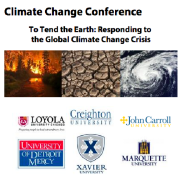Jesuit Higher Education: Better Leveraging Resources in Service of the Marginalized

BY NANCY TUCHMAN | July 8, 2015
Over 200 leaders from Jesuit colleges and universities across the global are gathering in Melbourne, Australia, this week for a conference entitled, “Expanding the Jesuit Higher Education Network: Collaborations for Social Justice.” ISN has invited a number of attendees to offer reflections on the sessions and discussions taking place during the gathering.
200 leaders from Jesuit universities, colleges, and other related institutions from around the world have gathered this week to explore the Mission of Jesuit higher education globally in today’s world.
In his welcoming address to the conference, Fr. Michael Garanzini, S.J., Secretary of the Higher Education Secretariat of the Society of Jesus, offered a synopsis of where the Society has come since the last meeting of this kind in Mexico City in 2010.
At that meeting, Fr. General Adolfo Nicolas, S.J., developed three central themes:
- Depth in human relationships is too often lacking. For example, think of the superficiality of Facebook “friends” and relationships with Twitter “followers.”
- Creativity is needed as an antidote to the “business-as-usual” inertia of cultures.
- Networking among our 175 Jesuit Colleges and Universities around the world will allow us to leverage resources so that we can do more (magis).
Through the 5 years since that meeting, the Fr. Nicolas has travelled around the world visiting Jesuit apostolates. Five themes have emerged in the talks that he has given:
- The Catholic and Jesuit mission/identity must have primacy within our universities.
- We must provide access to our education to the poor.
- There is a new interest in Ignatian Spirituality and Pedagogy among youth.
- Inter-religious dialogue needs to increase on our campuses.
- Environmental sustainability and economic justice need to be prioritized in our universities.
One of Garanzini’s goals for the current Melbourne gathering is to learn how to facilitate stronger networking among the 175 Jesuit Colleges and Universities, to better leverage resources in service of the marginalized. He also asked how he as Secretary of Higher Education could be helpful, and if the Society should think about staffing the office so that more could be done to help facilitate the network.
Share your responses to his questions and any other suggestions in the comments below.
Nancy Tuchman is the Founding Director of Loyola University Chicago’s Institute of Environmental Sustainability. Tuchman spent the first 14 years of her career as a Professor of Aquatic Ecology in the Department of Biology at Loyola University Chicago. In 2002-2003 she served as a Program Officer in the Ecosystem Studies Program at the National Science Foundation in Washington D.C., then returned to Loyola to serve as the Associate Provost for Research for five years (2004–08). In 2005 she founded and directed the Center for Urban Environmental Research and Policy (CUERP) at Loyola. From 2010 – 2013 she served as the University’s Vice Provost before being appointed to direct the IES.
Her vision for IES is to raise public awareness of the unsustainable consumption of our Earth’s natural resources with the goal of transforming behavior, developing policy, and inspiring and preparing next generation science-based environmental leaders. To that end, IES engages students, faculty, staff and administrators in activities designed to lower our campus consumption of energy and natural resources, and reduce our waste production. Under Tuchman’s direction, IES has developed several flagship programs including producing biodiesel which converts waste vegetable oil into fuel and uses it in our intercampus shuttle buses; using waste glycerin to produce soap which is being sold in our campus stores; and growing food organically at our 4-acre student run farm and on our urban campus gardens.
Tuchman’s research focuses on human impacts on aquatic ecosystem structure and function. Her work has spanned from investigating the effects of greenhouse gases on stream ecosystem food webs, to the impacts of invasive plant and animal species on Great Lakes coastal ecosystems, to the effects of emerging contaminants such as plasticizers (Bisphenol-A), and pharmaceuticals (e.g. antibiotics and endocrine disruptors) on streams and lakes. Working with students in research is one of the most rewarding aspects of Tuchman’s career. Throughout her 25-year career at Loyola, she has mentored or co-mentored 74 undergraduate students in individual research projects, and 34 graduate students.









I am only now hearing about the conference. The topics and concerns are timely with my own recent observations and concerns. This concern is the apparent lack of focus and action to enhance, at least one, critically positioned and important Jesuit institution of higher education outside of the US. I will try to send Fr. Garanzini, SJ an email. At the same time, I have decided to see what I can do to enhance the distinction and profile of this and maybe other critically important campuses overseas.
Ray Oliver, Esq.
LOYOLA Lks Shore ’73